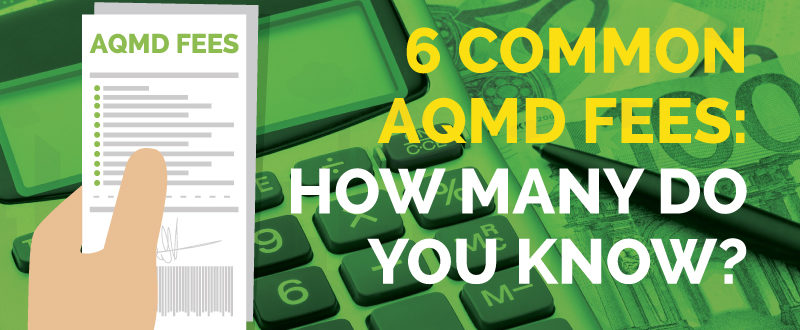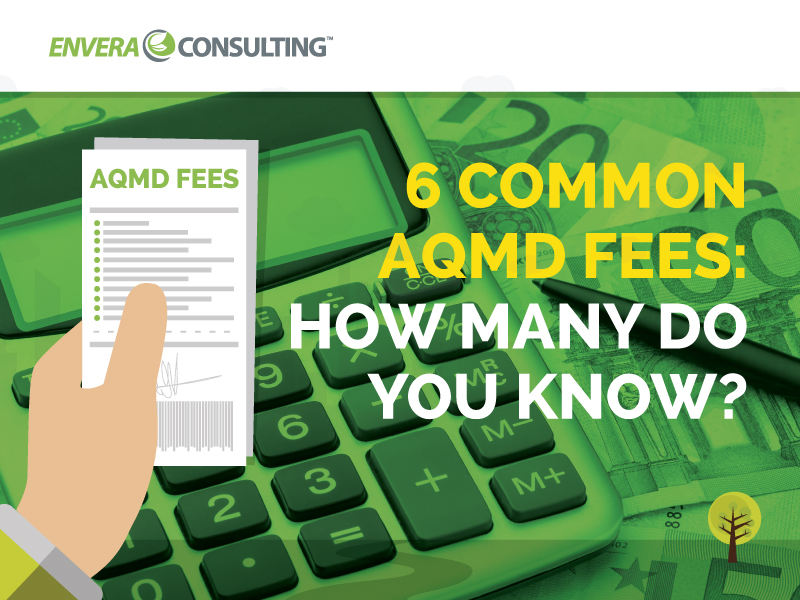

At the end of the day, government agencies operate very much like businesses.
They have budgets, which consist of operating expenses as well as sources of revenue. In the case of the South Coast Air Quality Management District, a significant source of that revenue is the fees collected from stationary sources (manufacturing factories, refineries, gas stations, etc.).
A complete list of SCAQMD fees can be found in Regulation III, which currently contains 22 rules. Of those, the most common fees that the SCAQMD can collect are outlined in Rules 301 and 306. The fee rules also include due dates for certain services, such as the annual emission report.
Then there’s Rule 313, which gives the SCAQMD the authority to adjust the fees and the due dates. As with any service or good, it’s normal to see the fees increase by a small percentage each year.
Let’s look at six of the most common fees that facilities pay.
1. Annual operating emissions fee (Rule 301 (e))
For certain facilities, namely those that have emissions over the reporting thresholds, submitting an annual emission report can feel a lot like filing taxes: You prepare an emission inventory and pay fees based on the amount of pollutants you emit into the atmosphere — the more you emit, the more you end up paying.
2. Permit processing fee (Rule 301 (c))
Getting a permit from the SCAQMD is one of the most common interactions companies have with the agency. When applying for a permit, you’ll need to prepare a permit application, which consists of a set of forms, permitting fees, and a detailed engineering evaluation.
The fees submitted with your permit application are arguably the most important piece of the puzzle, because if the fees are incorrect, the SCAQMD will return your application unprocessed.
3. Annual operating permit renewal fee (Rule 301 (d))
Unless they are renewed, operating permits expire each year. The process of renewing a permit involves paying a set fee on each piece of permitted equipment, while additional fees are required to renew permits for equipment located at facilities with a Regional Clean Air Incentives Market (RECLAIM) and/or Title V permit.
4. Reinstating expired applications or permits fee (Rule 301 (g))
If a permit for a piece of equipment expires (because you either didn’t pay the renewal fee or submit a renewal application), then the permit will be canceled within the year, after which you will lose your ability to operate (in compliance with the SCAQMD’s rules). Note that there’s a difference between an expired and a canceled permit.
During this one-year window, the SCAQMD considers your permit to be expired. If you want your permit reinstated within that year, you’ll need to pay a fee, plus a reinstatement surcharge (basically, a fee on top of a fee).
Once the one-year window passes, the SCAQMD will cancel your permit altogether. In order to get it reinstated, you have to go through the entire permitting process again, which in addition to being a headache can also cause significant problems.
5. Protocol/report evaluation fee (Rule 306 (m))
Source tests, also called stack tests, are measurements taken directly from the exhaust stack of a piece of equipment while it’s in operation. If a source test is required by the AQMD to fulfill a rule requirement, then a source test protocol needs to be submitted for approval before conducting the test. Needless to say, that protocol approval comes with a fee.
6. Review of continuous emission monitoring system (CEMS) fee (Rule 301 (j)(5)(A))
Some equipment might require a continuous emission monitoring system (CEMS) to maintain compliance with a certain rule. If such a system is needed, you’ll need to apply for a permit (referred to as a certification in CEMS terms) from the SCAQMD prior to installing and operating the system.
In the end, paying the proper fees to the SCAQMD is an important part of remaining in compliance, since permits can be returned unprocessed or even canceled if the proper fees are not submitted. In more extreme cases, violations can be issued if an annual emission reporting fee is not submitted, and the SCAQMD can even tack on interest on top of that.
If you need help determining what fees are due or even if you’re being charged the correct fees, contact us and we’ll help you out.